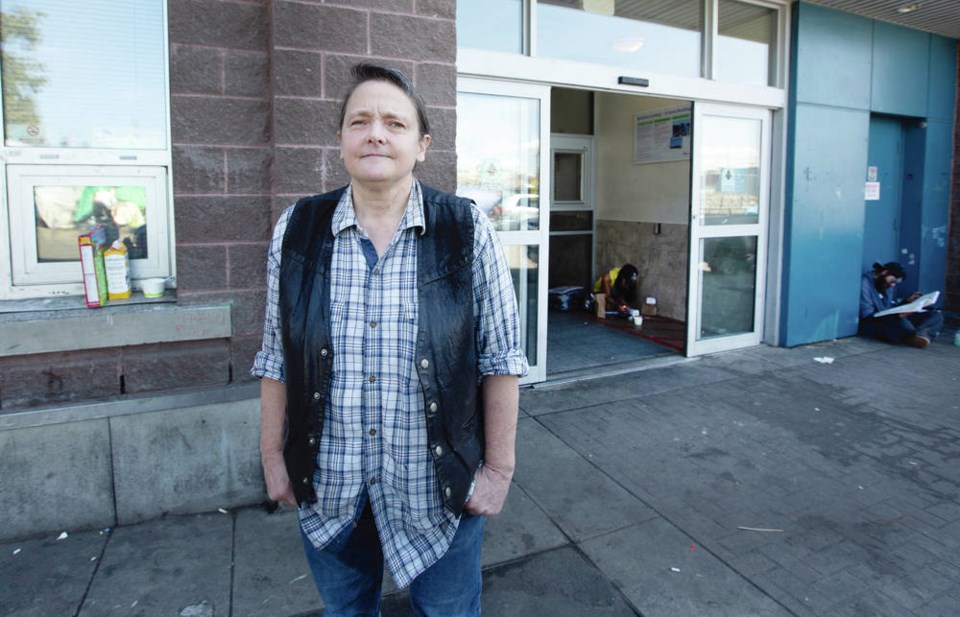Willi Boepple feels like society wants her to die. The 60-year-old has lived in a Victoria shelter for the past year, and has struggled with homelessness and inadequate housing ŌĆö sometimes without hot water ŌĆö for much of her adult life.
She found her way to Rock Bay Landing after losing her home a couple of years ago when the property owner decided to sell. When she found out her herd of prize-winning dairy goats were given away, the loss was devastating.
Boepple said it hurts to hear and see comments, many ŌĆ£too painful to read,ŌĆØ from people describing the homeless as lazy, dirty and dangerous. The message sheŌĆÖs getting is that people are not interested in acknowledging homelessness as a crisis and trying to find real solutions to a national problem.
She said she feels like society just wants homeless people to die. ŌĆ£They donŌĆÖt want to fix the problem. They want us to go away,ŌĆØ Boepple said.
She said she thinks many housed people find it uncomfortable to see people living outside, because itŌĆÖs a reminder of their own good fortune. Instead of reflecting on that privilege, Boepple said she thinks people find it easier to stereotype those living outdoors as morally deficient people who have made bad choices and deserve to live on streets and in parks.
ŌĆ£They donŌĆÖt want to realize that, yes, it can happen to them,ŌĆØ she said. ŌĆ£I want society to know this can happen to the most hardworking among us.ŌĆØ
She wants people to know that not everyone who is homeless also struggles with addictions, and those who do are often trying to cope with serious trauma. Like Boepple, many on the streets and in parks and shelters have health concerns. Boepple has chronic obstructive pulmonary disease, arthritis and three titanium joints, the result of physical labour and years spent working in a plywood mill, she said.
Boepple can remember the first time she felt the fear of losing her home. She was three years old, and her mother kicked her out of the car on the side of the highway because she was crying. Her mother, whom she described as abusive, drove away and disappeared from view before eventually returning.
The experience terrified her.
ŌĆ£As a three-year-old, I realized that there was no place that was really my own. That somebody else owned it and I could always be thrown out at their will,ŌĆØ she said. ŌĆ£Now I have no place that even pretends to be mine.ŌĆØ
SheŌĆÖs grateful to have a roof over her head at the shelter, but life there is still difficult, with a lack of privacy, the risk of losing her bed if she stays away too long and the grief of losing friends and neighbours.
ŌĆ£Just recently, they had a little memorial up there for five people. And some of the people I actually knew are people who have died,ŌĆØ she said.
Grant McKenzie, communications director for Our Place Society, said people tend to lump everyone on the street together, instead of recognizing that each person is an individual.
ŌĆ£I think we do have to remember that these are human beings. These are somebodyŌĆÖs daughter or son,ŌĆØ he said.
He said a recent increase in crime is linked to about one per cent of those living outside and the vast majority of people he interacts with daily are not violent. But everyone on the street is getting painted with the same brush, he said, which further stigmatizes people who are already pushed to the margins of society. While homelessness has become more visible to many during the pandemic, McKenzie said itŌĆÖs important to remember that the problem isnŌĆÖt new. ItŌĆÖs the result of decades of budget cuts to mental-health funding, he said.
ŌĆ£If we really want solutions, we really need the federal government involved, and we really need people who are willing to take risks and think a little bit differently,ŌĆØ McKenzie said.
Kathy Stinson, CEO of the Victoria Cool Aid Society, which runs the Rock Bay Landing shelter, said homelessness has become a polarizing issue in the city, and itŌĆÖs important to listen to the legitimate concerns raised by those who are affected by a more visible homeless community.
ŌĆ£We canŌĆÖt dismiss those. TheyŌĆÖre a reality. ItŌĆÖs also a reality that with COVID, there are fewer shelter beds available, because weŌĆÖve had to scale back our capacity,ŌĆØ she said.
Stinson said thereŌĆÖs a tendency to focus on the negative, but sheŌĆÖs encouraged by the provinceŌĆÖs response during the pandemic, which has seen more than 300 people moved from outdoor camps into motel rooms, as well as the generosity of community members who have donated money and grocery cards.
ŌĆ£WeŌĆÖve seen a lot of really, incredibly good will,ŌĆØ she said.
